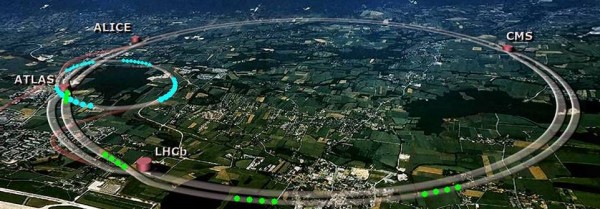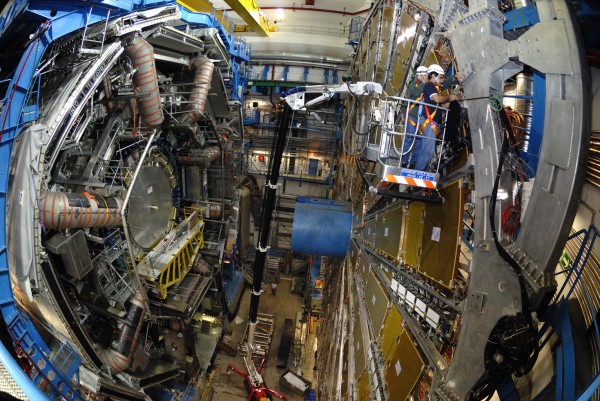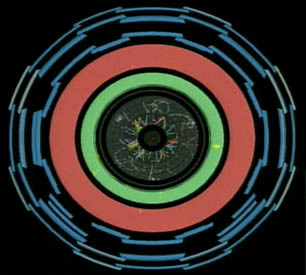The stakes are high, and win or lose, worth playing for. -Fred Hoyle
Yesterday was a record-setting day for humanity. Over at CERN, the Large Hadron Collider achieved a new record for the most energy ever created in a laboratory collision in the history of humanity: 7,000,000,000,000 electron Volts, or 7 TeV (Tera- or Trillion-electron-Volts) for short.

Sure, we get energies higher than this all the time from black holes, neutron stars, and other catastrophic processes in space. Occasionally, we even observe them, in the form of Cosmic Rays!

But there are two big differences between cosmic rays and collisions in an accelerator like this. First, cosmic rays are moving incredibly quickly with respect to the Earth, which is at rest! A cosmic ray striking the Earth is like a hollow-point bullet striking its target; the target suffers incredible damage not just at the point of impact, but all throughout it. In terms a physicist cares about, the energy gets distributed throughout the target, over a wide volume and over a huge number of particles.

In a collider, however, we can control this collision. We take a proton moving very close to the speed of light moving clockwise throughout the accelerator, and another proton moving very close to the speed of light moving counterclockwise throughout the accelerator! This is like shooting two bullets at the same speed directly at each other, and hitting them dead on! (Sorry for the low-res image below; it's the best I could find!)

When this happens, the energy can nearly all go into producing new particles!
So that's the first big advantage to having a collider. The second is that you can control where these collisions occur, and so you can choose a collision point and build a giant detector around it! What do I mean by "giant detector?" There are two. There's the CMS detector (the "C" stands for Compact, believe it or not):

and the other one is the ATLAS detector, which is even bigger!

So you build these giant detectors around your collision points, and you track what comes out! If you record the right data, and you do your analysis properly, you can reconstruct what happened during the collision. This is a huge deal, because something spectacular happened at the LHC.
That 7 TeV collisions that took place yesterday were more than three times as powerful as the previous "world's most powerful accelerator," the Tevatron at Fermilab. After just a few months, the LHC will have more data at a higher energy than Fermilab has ever achieved over its entire existence! (And that means cumulative, since the 1970s!) This was a snapshot from the main control room at the LHC yesterday,

and this is what the tracks looked like from one of the very first 7 TeV collisions that took place there!

The Universe hasn't seen consistent collisions at energies like this since it was just a few hundred microseconds old, or less than a second after the big bang!
What this means is that we have an opportunity to discover new, more energetic and more exotic particles that might exist in our Universe than ever before. Does the Higgs exist? We should know in just a few years. Do supersymmetric particles exist? If they do, the LHC should find them; if not now, than in about three years, after the upgrade to double its current energy: 14 TeV! Are there extra dimensions? If they're relevant to our existence, we should find that out relatively soon, too!
So I'm curious to know what you think? Is the LHC likely to find any of these? Do you think that there are exciting possibilities (like technicolor, maybe?) that I missed that are worth exploring? Or will the LHC turn up nothing new at all, and force us to re-think how things as fundamental as mass work?

The LHC will reveal never seen before particles/forces/attributes AND force us to re-think how things as fundamental as mass work.
The investigation of the muon's anomalous magnetic dipole moment will be of great interest eh?
Secondary jet collisions at higher energies will be interesting too!
Actually there is a lot that can come from this...can't wait.
I think it was an irate Hans Bethe who complained about discussions of sub-atomic particles since each experiment only revealed a little information and yet people seemed to happy to invent new names for every single observed phenomenon. The LHC scientists will have a fun time sorting through the data to see if there is in fact anything new to be learned. At the very least they should be able to say "The Higgs Boson was not observable under these conditions" and any ideas about the Higgs Boson will need to be modified somewhat. I don't know what it will take to say "Higgs is wrong, we need another explanation" other than somewhat unexpected (and not already theorized) results from the experiments. It's quite a feat really; if only those monstrous detector arrays could be shrunk even more so that more detectors could be crammed in ... It's somewhat amusing how, after only a few decades after the invention of the Quantum Mechanics it has become so difficult to devise new experiments to test ideas and learn more.
Super-luminal teleportation punches a neat hole in Relativity. Massive neutrinos are a stumbling block for the Standard Model. I suspect that the end result will be a crazy outcome that leads to a revolution as big as the one that happened at the turn of the nineteenth century.
I almost forgot. As to Super String theory: There will be no sparticles.
You mean after it finds that we're all dead as a result of those collisions, right? (Sorry, but it is April 1.)
I'm going to say yes on the Higgs. I thought I remembered reading that Fermilab had seen hints of it, though I could be thinking of something else.
I feel less certain about supersymmetry and extra dimensions, but if I had to guess, I'd guess no on them.
I'm guessing most of the talk about LHC telling us something about dark matter is meant to refer to supersymmetry?
Also, aren't there four or five detectors in total? Are the others online yet?
Compared to you guys I know squat about the topic but just from a simpleton's point of view....
Even if all these things occured in the first collisions, I'm guessing the amount of data produced is immense. Is there any chance that the analysis of the data will keep up with the speed of collection of that data - I'd imagine the sheer volume leaves us open to missed information - or only realising what is in the data years after it is collected.
So I'm guessing it could be years rather than months before anything concrete comes out of these experiments
My neighbour is very worried. However he always talks about the Large Hardon Collider.
Which makes it a bit difficult for me to keep a straight face.
He is still worried.
I just hope that quarks turn out to be the smallest sub-units. It took 50 years to get from atoms to quarks, now it's another 50 years and we start smashing things at CERN. I want to hear the end of the story before I die, not "the accelerator we built around the moon to achieve 100 PeV isn't big enough".
Why didn't Ethan include a link to the LHC webcam page? It's a little dull, but here it is nonetheless:
http://www.cyriak.co.uk/lhc/lhc-webcams.html
I'm quite curious about the E8 Lies Group and Lisi's controversial work.
"By matching 226 known standard model particles to some of the 248 symmetries of E8, Lisi is able to predict the existence and quantum numbers of 22 new particles."
   â An Exceptionally Simple Theory of Everything - wiki
It will be interesting if superpartners are seen, invalidating Lisi's predictions.
While Lisi doesn't predict mass for unobserved additional particles fitting his model (therefore unfalsifiable), it will be very interesting if new particles are observed that do fit his model.
Any thoughts?
Morgan,
You're absolutely right! In the Atlas detector alone, there will be one collision every 25 nano seconds, which amounts to about 40 million collisions per second, and each collision generates about 300 MB of data... So we're talking on the order of thousands of Terabytes of data for every second the detector is turned on.
Clearly the data can't all be stored, so there are triggers that read out the data as collisions occur and decide whether or not to keep it. The processes the physicists are looking for are very rare, so in the end *only* about 200 events are kept every second.
Generally, the good results from a project like this don't come for some time (ie. years) after the initial switch on. For the LHC alone, it will need to be running for two years (if I remember correctly) before we'll be able to say definitely whether the Higgs exists in a certain mass range. After the upgrade, another couple of years of data should be able to say absolutely whether there's a Higgs or not of any mass.
The problem is the events we're looking for are so rare that even though we have 40 000 000 collisions per second, we can only expect to see a handful of interesting events (Higgs, for example) in a few years of running.
Geoff,
That information is quite interesting.
Ethan,
That story is also quite interesting. Although I have heard almost all of it before. Question: What factors determine the particles created when protons crash?
The first big wonder of the LHC is that it even got built. Such a tool of science demonstrates enormous scientific, engineering, political and economic will to invest in dreaming about and exploring the fundations of our world.
For me the most interesting thing is "After just a few months, the LHC will have more data at a higher energy than Fermilab has ever achieved over its entire existence! (And that means cumulative, since the 1970s!)" This suggests that fringe ideas can be tested and explored that were previously squeezed out of the testing schedule of previous generation machines.
Roger Penrose (2004) said, "The kind of mass that these unobserved particles are now being postulated to have is something like a thousand times that of a proton, or more. I have to say that I am far from alone in believing that this looks a little contrived." Even earlier Feynman made similar remarks. Soon we will see the results of experiments. I expect the extra energy of collisions will disappoint by providing another round of null results. The first theoretical reaction will be to AGAIN increase the "theoretical" masses of the sought after particles. But longer term, I think, the theorists will be forced to explore fringe ideas.
I expect the idea that "anti-particles are particles moving backwards in time" will have to be formally incorporated throughout quantum theory; including the carefull definition of time properties of particles at the quantum level. With that physicists will cease talking about the annihilation of matter and antimatter in collisions and instead adopt the terminology of phase transitions from matter to antimatter and such. Fixing our concept of time is essential if we are ever to develop a robust theory of quantum gravity.
New understanding about the nature of time, antimatter, the quantum vaccuum will give specific clues as to how to narrow the 10^500 differenet string theories to 1 or a few. Thus extra-dimensionality will be accepted theory because it will prove to be necessary to explain experimental results.
Finally, the LHC will give totally unpredicted results to current theory and thus will encourage new theory and experiments to clarify strange new phenomenon. Of course, much old data from previous generation accelerators will have to be reinterpreted. It should be an exciting few decades.
@Thomas: I don't understand Penrose's objection. We know already that there is a very wide range for the masses of the elementary particles (from less than 1 eV for the electron neutrino to about 175 GeV for the tauon - that is more than 11 orders of magnitude!). So what is "contrived" about particles with masses of about 1 TeV?!?
I suppose to refer to supersymmetric partner particles here? If yes: why "again"? When where the "theoretical masses" of these particles ever increased? If no: what particles are you talking about?
This idea has been incorporated into Quantum Field Theory essentially right from the start (Feynman, who was the originator of this idea, was also one of the fathers of Quantum Electrodynamics - didn't you know that?). What exactly is "time property" supposed to mean?
The reason that physicists talk about annihilation is simply that we, the observers, don't travel back in time - hence to us it *looks* like an annihilation, and there is no reason to talk in any other way about that. Every particle physicists knows about the interpretation of antimatter as matter travelling back in time - there is no reason to talk about that all the time or change terminology for that. And: You don't know what "phase transition" actually means in physics, right?
And you know this how...?
First off I have to say that the picture of the bullet going through the full can of beer pretty much broke my heart :(
But this stuff that is going on at the LHC is simply amazing, I cannot wait until they discover more answers to the questions that puzzles so many of us :)